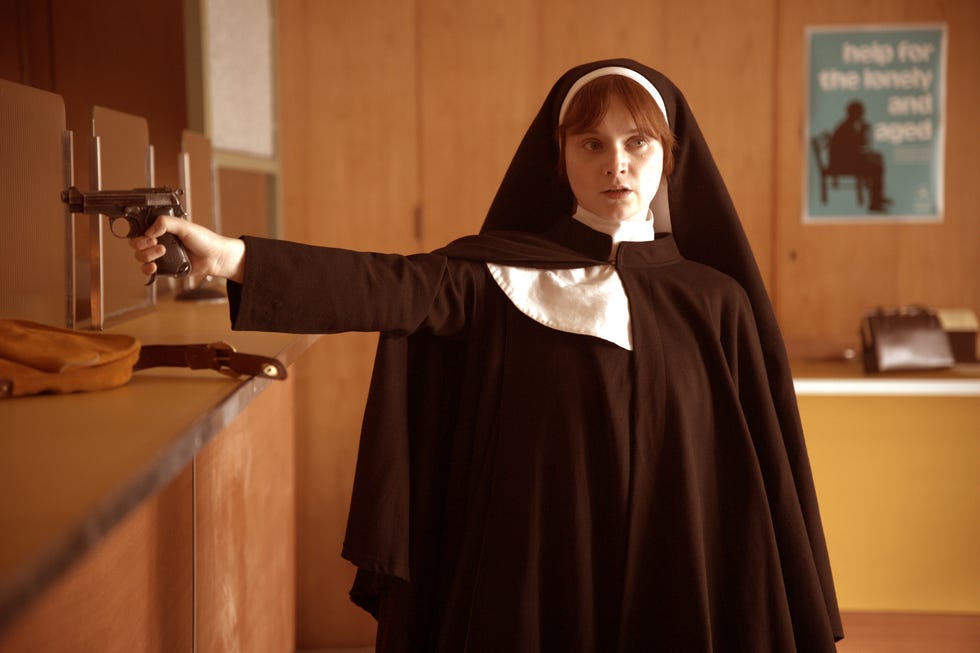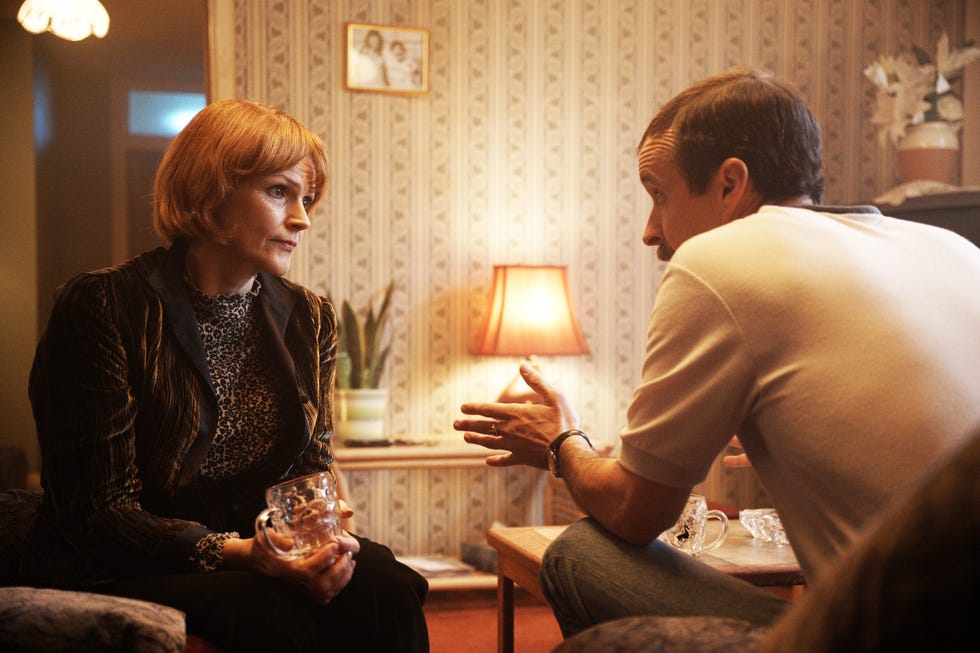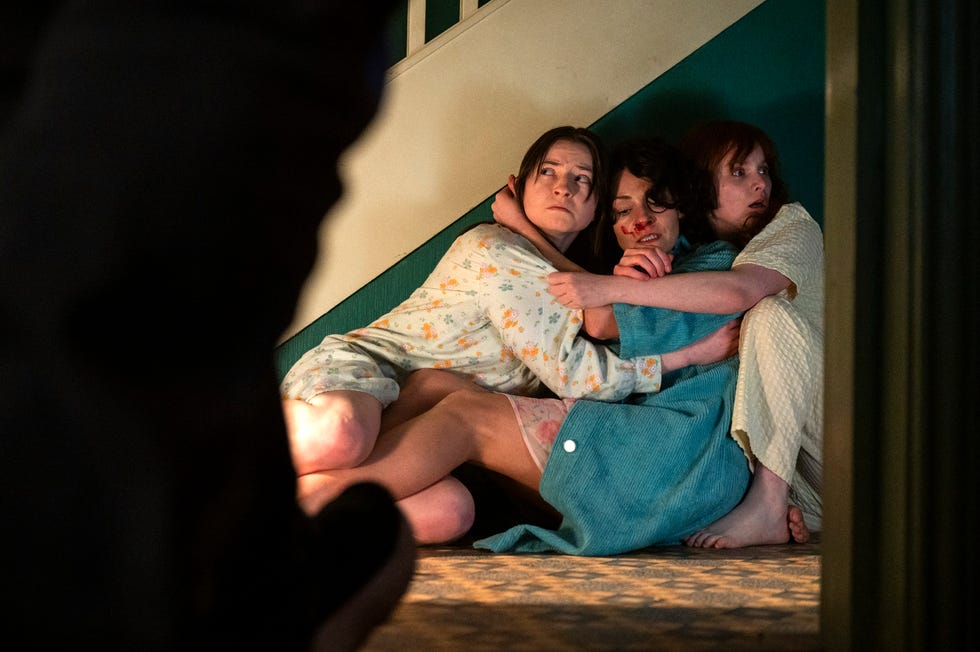Adapting Patrick Radden Keefe’s bestselling book Say Nothing into a compelling television series was a monumental task. “I was well aware going in that brilliant books often make terrible films,” showrunner Joshua Zetumer tells T&C. “How do you do the story justice, especially given the scope and ambition of the book?”
Say Nothing: A True Story of Murder and Memory in Northern Ireland centers on the 1972 disappearance of Jean McConville, a 38-year-old widowed mother of ten, and her family’s decades-long search for justice. McConville’s abduction and murder is the entry point into a compelling history of the Troubles in Northern Ireland.
In turning the nonfiction book into a nine-episode miniseries, the involvement of author and investigative journalist Patrick Radden Keefe from the outset was essential. “I knew the producers, Brad Simpson and Nina Jacobson,” Radden Keefe tells T&C. “I probably wouldn’t have trusted the book to just any old producers, but because I knew them and I really admired their work, it started out as an exercise of putting trust in them. Then they said, ‘We’ll bring you on board and you’ll actually work with us. It won’t be a thing where you give it to us and we go away and we come back and we have the show.'”
Zetumer, who had written on numerous films, including RoboCop, Patriots Day, and the James Bond franchise, joined soon after. “When [producer] Brad [Simpson] slipped me Say Nothing, it was instantly my favorite book,” he tells T&C of Radden Keefe’s captivating non-fiction account of the Troubles. “I saw this opportunity to take on a project that reminded me why I’d wanted to become a filmmaker in the first place. The story was gripping, it was suspenseful, it was emotional. It had these vivid characters with real psychological depth, and it was true. At the same time, it was a huge creative risk because no studio was making anything like this. I signed on that early in the process, but it was so good that it was this moment where I just had to take the leap and I signed on just immediately.”
The most challenging part of bringing Say Nothing to television, however, was deciding what to leave out. Zetumer says, “I knew it was going to be one season—it had to be one season—and effectively, what we were trying to do, was cram as much into one season as most shows would do in three. The hardest thing about the adaptation, it wasn’t the fact versus fiction of it, it was: What do you not include? Because there is this just vast swirl of history around the characters. There’s sort of moment after moment, set piece after set piece. What do you cut?” Some key events that were left out include three hunger strikes (only one is in the show) and the controversy surrounding Boston College’s Belfast Project, in which ex-paramilitaries candidly discussed their role in the Troubles.
What was essential to include in the show from Radden Keefe’s book, however, was former IRA volunteer Dolours Price’s decision to participate in the Belfast Project. “That was something that seemed kind of essential to the DNA of the book that you would need in the series,” Radden Keefe says. “The series does this slightly edgy thing—that the book does too, but it’s more visceral in the series—in the sense that we take very seriously this political choice by young people to take up arms and engage in acts of terror and put bombs in public places. I don’t think we condone those decisions, but we want to understand those decisions.”
He continues, “Part of the reason that these people did it is that it felt very romantic at the time, and it’s important to try and capture some of that romance that they felt, but I don’t want to romanticize it myself. I don’t think the series should. They only responsible way is to show the hangover. In the series, the first person you meet is Jean McConville. You see the consequences from the start.”
The overarching theme, and message, of the book and the show are one and the same: The truth will always find a way out. “If you have a situation in which the truth is suppressed, or there’s a code of silence, or there’s a kind of desire to look away, the past doesn’t go away just because you avert your eyes,” Radden Keefe says. “You can feel it in Dolours in those later episodes that she’s been so muzzled. It’s painful and it’s ugly at times, but she just needs to tell her story.”
And though it’s a period piece, largely set in Northern Ireland during the Troubles, the story feels ever-relevant for today’s world, which is a distinct change from when Radden Keefe initially worked on the book. “When I was working on the book, it really did feel like I was describing a distant time and a place,” he says. “But then as we started putting this series together and the writers started writing the scripts, Black Lives Matter happened. Ferguson happened. Suddenly, you saw peaceful protestors on the street and militarized cops trying to shut them down. These questions of radical politics… How do you change the world? What really does make sense? What’s justifiable? How you avoid a wild, irrational escalation? All those questions feel very, very germane to me today.”
All nine episodes of Say Nothing are now streaming on Hulu. Watch now
Emily Burack (she/her) is the Senior News Editor for Town & Country, where she covers entertainment, celebrities, the royals, and a wide range of other topics. Before joining T&C, she was the deputy managing editor at Hey Alma, a Jewish culture site. Follow her @emburack on Twitter and Instagram.
This post was originally published on here










